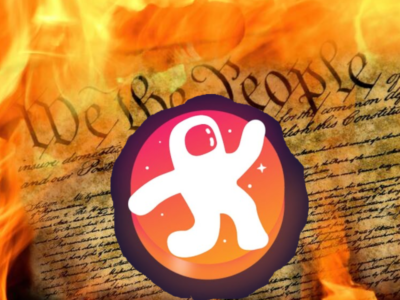WikiLeaks creator Julian Assange will now be able to appeal December’s ruling approving his extradition to the United States. This is one of his last chances to avoid being sent across the Atlantic to face outlandishly over-stacked charges relating to WikiLeaks disclosures from 2010 and 2011.
WikiLeaks is the publisher responsible for revealing U.S. military war crimes in the Middle East, corruption in the U.S. State Department, and internal malfeasance on the part of the Democratic National Committee, among other things.
The idea behind the site is that it would act as a publisher of material that whistleblowers felt needed to be released. One famous WikiLeaks whistleblower was Bradley Manning, who now LARPs as a woman and denounces Assange. All charges currently pressed against Julian Assange have to do with the leaks from Bradley Manning. He is not being charged with anything having to do with the DNC leaks or anything to do with Russia.

Bradley Manning
Ever since drawing the ire of Western governments, Assange has been subject to political persecution and arrest warrants. In 2012, he entered the Ecuadorian embassy to the United Kingdom in London seeking political asylum, which was granted. He then lived inside that embassy for about 7 years.

Julian Assange in the embassy
The relationship between Assange and the government of Ecuador deteriorated over time. Pressure from the Trump administration didn’t help. In 2019, Ecuador rescinded Assange’s political asylum and he was placed in the high-security UK prison at Belmarsh, where he has been ever since.
Assange currently faces 18 federal charges pressed by the United States federal government. The first charge was a 2018 sealed indictment for conspiracy to commit computer hacking. It was unsealed in 2019.
“Assange and Manning [entered] into the agreement to crack the password stored on US Department of Defense computers connected to the Secret Network.”
More details are provided elsewhere in the indictment:
“The [password] was stored as a “hash value” in a computer file that was accessible only by users with administrative-level privileges. Manning did not have administrative-level privileges, and used special software, namely a Linux operating system, to access the computer file and obtain the portion of the password provided to Assange.”
So I don’t know how the U.S. government sets up their Secret-level network (SIPR), but somehow a Private First Class was able to bring in a Linux image burned to a compact disk and then get access to a file with password hashes.

This meme is closer to the truth than I realized
Brief context on the term “hash” with respect to passwords: Passwords aren’t generally stored in files or databases, instead what is stored are hashes of passwords. A hash is the result of a one-way algorithm that takes an input and produces a deterministic fixed-length output. When someone logs in, the hash of the submitted password is calculated and compared with stored hash. If they match, a person is authenticated.
The process of “cracking” a password from a password hash is similar to mining for cryptocurrency. You can try the password “aaa” and see if it hashes the given value. Then you can try the password “aab” and see if it hashes to the given value. And so on. A lot of this computation has been done and there are online tools that will lookup hashes against these tables.
| Password | MD5 Password Hash |
| a | 0cc175b9c0f1b6a831c399e269772661 |
| password123 | 482c811da5d5b4bc6d497ffa98491e38 |
| password123! | b7e283a09511d95d6eac86e39e7942c0 |
A table of passwords and their hashes, using the MD5 algorithm. Note that the hash for “password123” is not similar to the hash for “password123!”
As a defense against this type of lookup attack, it is common to “salt” passwords by adding a long value to the password before it hashed, making it computationally impractical to crack hashed passwords even when they are compromised. I don’t know any details about the nature of the password hash that Bradley Manning got for Julian Assange but check this out from the indictment:
“Cracking the password would have allowed Manning…”
Assange was never able to get the password, and Manning got what information he could without it. Additionally, the charge had a maximum penalty of 5 years. That wasn’t enough for ZOG, so in May of 2019 the Trump administration added 17 more charges in a superseding indictment and requested that Assange be extradited to the US.
In late 2019, the journalist Cassandra Fairbanks was aware from her connections to people in the White House that Rick Grenell, the Trump-appointed homosexual US Ambassador to Germany, was largely responsible for the effort against Assange.
The new indictment stacks charges in an underhanded way. The leaks are logically divided into categories (State Department cables, Guantanamo Bay debriefing documents, etc) and for each category there is a separate charge for (1) unauthorized obtaining, (2) receiving, and (3) disseminating, plus some other umbrella charges. It would be one thing if separating the charges in this way made the complaint clearer, but in this case each charge can carry up to 10 years. As a result, Assange faces over 170 years in prison if convicted on all counts.

Sometimes people in US custody end up dead
One thing that Assange’s lawyers argued in his extradition defense was that it would be inhumane to send him to America given his health and mental condition. This was the only part of Assange’s defense that a UK high court accepted when they denied the extradition request in January of 2021.
The UK decision was quickly appealed by the Biden administration, which also offered several diplomatic assurances about how Assange would be treated. One of them was that Assange could be transferred to Australia to serve any sentence if convicted.

Sometimes people in the custody of US allies end up dead too
The more recent ruling from December overruled the previous decision, on the basis that US assurances were satisfactory. A major plank of Assange’s appeal is that the high court did not have the authority to unilaterally accept these assurances.
The court system has now given Assange permission to appeal to the UK Supreme Court, which is likely his last chance to avoid whatever it is the American security state has in store for him.










